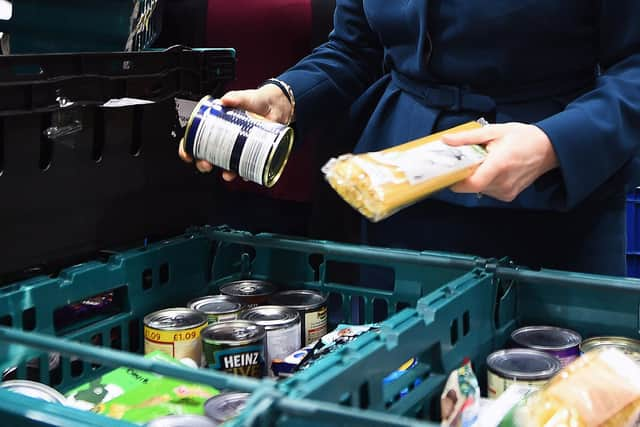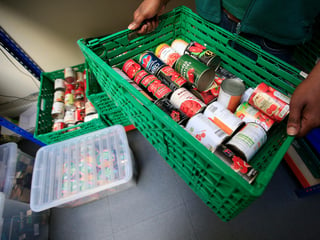In foodbank Britain, Scotland can end the scourge of 'in-work poverty' after the Covid pandemic ends – Richard Leonard


This festive season, it will be thanks to their selflessness and compassion that some of the poorest families are able to have any sort of Christmas dinner or presents.
Foodbank and community volunteers deserve their status as being amongst our Covid heroes, for their unswerving humanitarian contribution during ten months of pandemic hardship and deprivation. It is a testimony to the values of collectivism, self-help and solidarity, which have sustained our communities in 2020.
Advertisement
Hide AdAdvertisement
Hide AdOf course, prior to Covid, food banks were the established salvation for those left without any incomes to buy food, a roof over their heads, clothing, and other essentials.
Yet, the term foodbank was scarcely in use just over a decade ago.
It’s now as synonymous in summing up the vast scale of destitution in Britain from 2010 onwards as the term “dustbowl” was in characterising drought-ravaged communities of 1930s depression-era America.
A harsh and mean-spirited approach towards welfare claimants, with a system of brutal cuts, punitive benefit sanctions and sheer cruelty, has meant the term foodbank is in everyday use.
Tory ministers have relentlessly persecuted the unemployed, single parents and the disabled, via this cruel system, leaving many families stripped of state support.
Derisory and begrudging payments via the UK government’s Universal Credit have left so many people across Scotland with nowhere else to turn but to foodbanks.
This callous treatment of those struggling to pay for the essentials and get by had no place pre-Covid in any sort of civilised modern society.
However, when we eventually emerge from the pandemic, it must be consigned to the scrap heap of history, just as the means tests and workhouses of the 1930s were after the Second World War.
Advertisement
Hide AdAdvertisement
Hide AdWhat has been striking during my own visits to foodbanks is the large numbers of people queueing up for support, who have clearly just finished or are on their way to work.
The vast scale of low pay and insecure work has caused a rise in ‘in-work poverty’, making it a scourge of modern-day Scotland.
A decade-plus of austerity has seen the ripping up of the social contract that meant those in employment could generally expect to earn something approaching a living wage.
The grim reality is that it is now commonplace for those working, but struggling to support themselves and their families, to be forced to rely on the generosity of foodbanks to survive.
Pre-pandemic figures for Scotland showed that more than half of adults in poverty, or 56 per cent, were in households where at least one adult was in paid employment.
Inevitably, the crisis has deepened during Covid, with the likelihood of much worse to come during any post-pandemic recession.
Even for employees now back at work, ten months of being forced to exist on furlough payments, well below their usual take-home pay, has badly hit incomes and living standards.
Similarly, for those working in insecure employment and on zero-hours contracts, including those in the hospitality industry, who have seen their hours drastically reduced due to Covid restrictions, it has been a tough year.
Advertisement
Hide AdAdvertisement
Hide AdAll of this will inevitably contribute to a further rise in the in-work poverty figures.
Just last month the Chancellor was quick to declare war on the working poor, using his Spending Review to announce curbs on public sector pay, while halting a promised increase in the UK’s living wage.
Once again we were treated to a rather well-off Tory Chancellor lecturing workers and hard-pressed families about “hard choices”.
Just a few months ago, Sunak sought to portray his public face as that of a ‘kinder’ Conservative, with a gimmicky half-price eating-out giveaway and his carefully choreographed clapping of key workers outside his Downing Street residence.
Yet now, the Chancellor leaves employees, in the public and private sector alike, condemned to more in-work poverty with his curbs on a well-deserved pay rise for the nation’s workforce.
Sunak’s effective declaration that he will be an ‘Austerity Chancellor’ every bit as much as one of his predecessors, George Osborne, bodes extremely badly for the prospects of tackling in-work poverty.
The Chancellor’s intention to make the working poor and the most vulnerable pay the economic price for Covid is straight from the playbook of George Osborne and David Cameron.
We should not expect the Scottish Tory leader to mount any sort of opposition to this, having consistently voted with Boris Johnson’s government in the Commons lobbies.
Advertisement
Hide AdAdvertisement
Hide AdLabour stands fully against this disastrous cuts-driven approach, which left us so ill-equipped to deal with Covid, and which has precipitated a decade of economic failure, and ever wider income and wealth inequality.
However, the Scottish Parliament is not powerless in seeking to reduce the scourge of in-work poverty.
We will set out our plans in full as we countdown to next May’s election, but rest assured Scottish Labour will make cutting in-work poverty a priority, with a jobs-driven recovery, a ‘Real Living Wage’ of £10 an hour, and the proper use of government procurement powers to drive up labour standards.
This will be built on the back of our plans for a Green New Deal, and the creation of 130,000 jobs to lead Scotland out of a post-pandemic recession.
Only with that policy approach can we make tackling the modern-day scourge of in-work poverty our number one goal.
It is time we moved on from an economy built on low pay and long hours and a society where poverty is blamed on the poor and rampant inequality is seen as the natural order of things. That is not just about changing the policies of government, it is about changing the values and so the priorities of politics.
Richard Leonard is Scottish Labour leader
A message from the Editor:
Thank you for reading this article. We're more reliant on your support than ever as the shift in consumer habits brought about by coronavirus impacts our advertisers.
If you haven't already, please consider supporting our trusted, fact-checked journalism by taking out a digital subscription.
Comments
Want to join the conversation? Please or to comment on this article.
